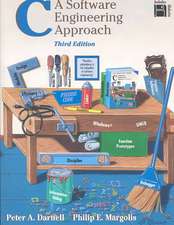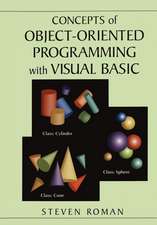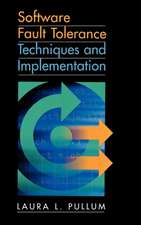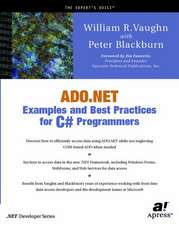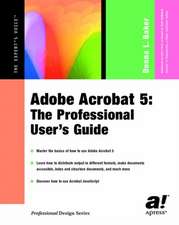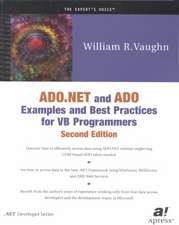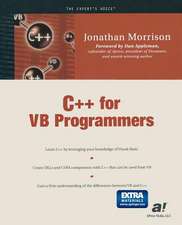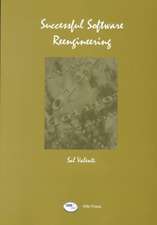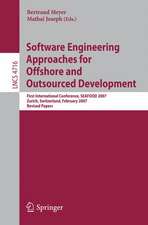Beyond Software Architecture
Autor Hohmann Lukeen Limba Engleză Paperback – 31 dec 2002
- A valuable resource for professionals who need to manage and properly balance the delicate relationship between technology and business.
- Practical! All team members will gain valuable instruction that can be immediately applied.
- A proven means of meeting customer needs over a long period of time by building better software.
- Audience:
Level:
Intermediate.
- Luke Hohmann is vice president of engineering for Preview Systems, a company that develops and markets an e-commerce infrastructure solutions. He earned BS and MS degrees in Computer and Electrical Engineering at the University of Michigan. Previously, he served as vice president, engineering and product development for Aurigin Systems, Inc. Earlier, he served as education technical director for ObjectSpace International. He is the author of Journey of the Software Professional: A Sociology of Software Development. He has been a frequent speaker at OOPSLA and Software Development Conferences.
Preț: 328.68 lei
Preț vechi: 410.85 lei
-20% Nou
Puncte Express: 493
Preț estimativ în valută:
62.91€ • 68.36$ • 52.88£
62.91€ • 68.36$ • 52.88£
Carte tipărită la comandă
Livrare economică 21 aprilie-05 mai
Preluare comenzi: 021 569.72.76
Specificații
ISBN-13: 9780201775945
ISBN-10: 0201775948
Pagini: 352
Ilustrații: Illustrations
Dimensiuni: 185 x 229 x 20 mm
Greutate: 0.58 kg
Ediția:1
Editura: Addison-Wesley Professional
Locul publicării:Boston, United States
ISBN-10: 0201775948
Pagini: 352
Ilustrații: Illustrations
Dimensiuni: 185 x 229 x 20 mm
Greutate: 0.58 kg
Ediția:1
Editura: Addison-Wesley Professional
Locul publicării:Boston, United States
Descriere
At last, a book that provides the software engineering community with a clearer understanding of the business value of software architecture. There are currently a significant number of books on creating, documenting, and implementing software architecture, but precious few resources have addressed how to build a software architecture that aligns with a customer's overall business goals. In this new book, Luke Hohmann borrows from his extensive experience managing successful enterprise software projects to provide practical wisdom on creating and sustaining winning software solutions. This book helps technologists grasp the business ramifications of their decisions, and provides business-oriented software professionals (e.g. sales people and marketers) with better knowledge of how robust software can be built and maintained.
Cuprins
Foreword by Martin Fowler.
Foreword by Guy Kawasaki.
Preface.
1. Software Architecture.
Defining Software Architecture.Alternative Thoughts on Software Architecture.Subsystems Are Designed to Manage Dependencies.Subsystems Are Designed According to Human Motivations and Desires.Give in to Great Architectures.Beauty Is in the Eye of the Beholder!Why Software Architecture Matters.Longevity.Stability.Degree and Nature of ChangeProfitability.Social Structure.Boundaries Defined.Sustainable, Unfair Advantage.Creating an Architecture.Patterns and Architecture.Architectural Evolution and Maturation: Features versus Capabilities.Architectural Care and Feeding.Technological Currency.Technological Debt.Known Bugs.License Compliance.Principles First, Second, and Third.Encapsulation.Interfaces.Loose Coupling.Appropriate Granularity.High Cohesion.Parameterization.Deferral.Creating Architectural Understanding.The Team.Chapter Summary.Check This.Try This.
2. Product Development Primer.
What Is Product Management?Why Product Management Matters.Product Development Processes: Creating Release 1.0.Concept Proposal.Product Proposal/Business Plan.Development Plan.Development.Final Quality Assurance.Prelaunch.Launch.It Isn't Like That.It Is a Waterfall Process and Those Don't Work.It Presents All Stages as If They Were of Equal Importance.It Doesn't Detail Any Time.Where Is the Iteration?It Doesn't Prescribe a Development Process.It Doesn't Identify the Level of Collaboration Between Groups within Stages.The Business Plan.Product Development Processes: Creating Release n.n.n.Augmenting the Product Development Process.Successive Freezing.Change Management Protocols.Recycle Bin.Crucial Product Management Concepts.The Four Ps of Marketing.Total Available Market, Total Addressable Market, and Market @BHEADS = Segmentation.The S-Shaped Curve of Adoption.The Whole Product.Technical versus Market Superiority.Position and Positioning.Brand.The Main Message.Chapter Summary.Check This.Try This.
3. The Difference between Marketecture and Tarchitecture.
Who Is Responsible for What?Early Forces in Solution Development.Creating Results in the Short Run while Working in the Long Run.Projecting the Future.Harnessing Feedback.Generating Clarity.Working in Unison.Reaching Agreements.Making Data Available.Context Diagrams and Target Products.Chapter Summary.Check This.Try This.
4. Business and License Model Symbiosis.
Common Software Business Models.Time-Based Access or Usage.Transaction.Metering.Hardware.Services.Revenue Obtained/Costs Saved.Rights Associated with Business Models.Tarchitectural Support for the Business Model.General Issues.Time-Based Access or Usage.Transaction.Metering.Hardware.Enforcing Licensing Models.The Honor System.Home-Grown License Managers.Third-Party or Professional License Managers.The Client.Market Maturity Influences on the Business Model.Choosing a Business Model.Chapter Summary.Check This.Try This.
5. Technology In-Licensing.
Licensing Risks/Rewards.Contracts—Where the Action Is.Contract Basics.License Terms.When Business Models Collide, Negotiations Ensue.Honoring License Agreements.Managing In-Licensed Technology.Open-Source Licensing.License Fees.Licensing Economics.Chapter Summary.Check This.Try This.
6. Portability.
The Perceived Advantages of Portability.The Business Case for Portability.Creating Portable Applications.Use an Interpreted Language.Use Standards-Based Persistent Storage.Make Business Logic Portable.Closer to the User Means Less Portability.Use XML for Standardized, Interoperable Communications between Subsystems.Avoid Hiding The Power of a Specific Platform in the Name of Portability.The Matrix of Pain.Step 1: Remove Configurations.Step 2: Rank-Order Configurations.Step 3: Make the Final Cut.Beware the Promises You Make.Chapter Summary.Check This.Try This.
7. Deployment Architecture.
Deployment Choices.Customer Site.Application Service Provider.Managed Service Provider.Transactional (Web Service).Customer Influences on Deployment Architectures.Control and Integration.Data Security/Privacy and Peak Loads.Costs and Vendor Confidence.Customer Skills and Experiences and Geographic Distribution.Corporate Influences on Deployment Architecture.Sales Cycle.Infrastructure Investment.Cash Flow.Flexibility.Geographic Distribution.Service, Not Price.Choosing a Software Deployment Architecture.Deployment Architectures and the Distribution of Work.The Information Appliance.Deployment Choice Influences on Software Architecture.Flexible, Parameterized, or No Integration Options.Upgrade Policies.Data Protection and Access.Migration Options.The Future of Consumer Software.Chapter Summary.Check This.Try This.
8. Integration and Extension.
Customer Control—The Driving Force.Motivations for Integration/Extension.Layered Business Architectures: Logical Structures.The User Interface Layer.The Services Layer.The Domain Model Layer.The Persistent Data Layer.Variations on a Theme.Creating Layered Business Architectures.Integration and Extension at the Business Logic Layers.Technologies and Locus of Control.Integration through APIs.Extension through Registration.Integration and Extension of Persistent Data.Views.User Fields.Hook Tables.Spreadsheet Pivot Tables.Extract, Transform, and Load Scripts.Tell Them What's Going On.Business Ramifications.Professional Services.Training Programs.Certification.User Community.License Agreements.Managing APIs Over Multiple Releases.Techniques.Chapter Summary.Check This.Try This.
9. Brand and Brand Elements.
Brand Elements.Names.Graphics, Slogans, and Other Brand Elements.When to Use the Trademark (™) Symbol.Managing In-License Brands.Brand Element Customizations.Changing Brand Elements.Product Areas to Change.QA and Change.Chapter Summary.Check This.Try This.
10. Usability.
Usability Is about Money.Mental Models, Metaphors, and Usability.Tarchitectural Influences on User Interface Design.Areas of Influence.The Need for Speed.Let's Be Clear on What We're Talking About.What a Marketect Really Wants with Respect to Performance.Responding to the User.Performance And Tarchitectural Impact.Chapter Summary.Check This.Try This.
11. Installation.
The Out of Box Experience.Ouch! That Might Hurt.Customer Fears.Installation and Architecture.Forces and Choices.How to Install.Installation Data Collection and Precondition Verification.Installation.Postinstallation Confirmation.Finishing Touches.They Don't Read the Manual.Test the Install and Uninstall.Chapter Summary.Check This.Try This.
12. Upgrade.
Like Installation, Only Worse.Upgrade Fears.Making Upgrades Less Painful.Choices for Painless Upgrades.Market Maturity and Upgrades.Chapter Summary.Check This.Try This.
13. Configuration.
Configurability—An Element of Usability.The System Context.Contextual Information.Initialization versus Execution.Setting the Value.Setting the Right Value.Configuration Parameter Heuristics.Chapter Summary.Check This.Try This.
14. Logs.
I Want to Know What's Happening.Not Just the Facts.Log Format and Management.Log Format.Log Management.Logging Standards and Libraries.Postprocessing Log Data.Logging Services.Chapter Summary.Check This.Try This.
15. Release Management.
Yes, You Really Need This.Establishing a Baseline.Release Management.What You're Releasing.Who You're Targeting.Why They Want It.Release Identification.Full or Complete ReleasesPartial Releases.Patch Releases.Variations.SKUs and Serial Numbers.SKU Management.Serial Numbers, Registration, and Activation.Release Management Influences on Tarchitecture.Chapter Summary.Check This.Try This.
16. Security.
Viruses, Hackers, and Pirates.Managing Risk.See No Evil, Speak No Evil.Digital Identity Management.Authorization—Defining Who Can Do What.Authentication—Proof of Identity.Transaction Security.Auditability—Proof of Activity.Integrity—Preventing Tampering and Alteration of Data.Confidentiality—Keeping Data Away from Those Not Entitled to It.Accountability—Holding People Responsible for Their Actions.Software Security.Software Security Techniques.Software Security Costs/Benefits.Information Security.Secret Algorithms or Secret Keys?Back Doors.Security and Marketecture.Areas of Interaction.Chapter Summary.Check This.Try This.
Appendix A. Release Checklist.
Appendix B. A Pattern Language for Strategic Product Management.
Applying The Patterns.Capturing the Result.Market Map.Market Events/Market Rhythms.Feature/Benefit Map.The Tarchitecture Roadmap.
References.
Bibliography.
About the Author.
Index. 0201775948T01212003
Notă biografică
Luke Hohmann is an independent consultant committed to coaching his clients to greater levels of performance in the areas of product management, software development, and organizational effectiveness. He has worked in and lead development, product marketing/management, quality assurance, support, and business development functions in both public and private companies. He has created software ranging from single-user programs costing less than $50 to distributed, enterprise-class software platforms costing multiple millions of dollars. Mr. Hohmann is the author of Journey of the Software Professional: A Sociology of Software Development (Prentice Hall, 1997), as well as numerous articles on software development.
0201775948AB01132003
0201775948AB01132003
Textul de pe ultima copertă
Praise for Beyond Software Architecture
“Luke Hohmann is that rare software technologist who views software development from the viewpoint of the end user. He passionately believes that one hour spent with an end user is worth many hours making software architectural choices or days documenting perceived user requirements. Most of what is written about software development focuses on methods used to design and develop robust software. Luke’s latest effort, Beyond Software Architecture, illuminates the more mundane aspects of creating true business solutions by supporting the user throughout the lifecycle of the software product. By concerning himself with creating business value, Luke tightens the connection between a software application and the business function it performs.”
—Bruce Bourbon
General Partner, Telos Venture Partners “There are two kinds of people that read the Dilbert comic strip: folks that take a moment to marvel at how accurately it reflects life at their company before moving on to the next comic strip, and folks that think Dilbert is an amusing reminder that high tech companies can and should be better than Dilbert’s world. Anyone in the first group should stick to reading comics. This book is for people in the latter group.”
—Tony Navarrete
Vice President, Diamondhead Ventures “Luke brings a proven methodology to the challenge of software development. In Beyond Software Architecture, Luke provides practical and proven techniques that all development executives can employ to improve the productivity of their software organization.”
—G. Bradford Solso
CEO, Taviz Technology “Beyond Software Architecture is the first book I have read which contains an insider’s perspective of both the business and technical facets of software architecture. This is a great book to get marketers and software managers on the same page!”
—Damon Schechter
CEO, LOC Global
author of Delivering the Goods “There are books on technical architecture and books on product marketing, but few, if any, on how architecture and marketing information must be integrated for world class product development. Beyond Software Architecture provides this valuable bridge between technology and marketing—it explains how to deliver quality products that are profitable in the marketplace.”
—Jim Highsmith
Director, Cutter Consortium
author of Adaptive Software Development “Product development managers, marketing managers, architects, and technical leads from all functions should read this book. You’ll see a pragmatic view of how to define and use a product architecture throughout a project’s lifecycle and a product's lifetime.”
—Johanna Rothman
Rothman Consulting Group, Inc. “Luke Hohmann has captured the essence of product creation in his latest book. He cleverly discusses the need for both the marketing and engineering roles in product creation and ties the two together building a good foundation for understanding and executing successful product creation.”
—Lee Sigler
Principal, 360 Market View, Inc. “Finally a book that deals with those often ignored but critical operational issues like licensing, deployment, installation, configuration and support. Beyond Software Architecture is the “What they don't teach you at Harvard Business School” book for anyone who develops software products—or buys them.”
—Mary Poppendieck
Managing Director, Agile Alliance
President, Poppendieck LLC “Luke Hohmann delivers a passionate, articulate wake-up call to software architects: it ain’t just technical any more! Technical architectures have profound business ramifications, and ignoring the business ramifications of portability, usability, configuration, upgrade and release management, security, and other architectural choices can not only lead to project failures, but ultimately to nasty lawsuits from disappointed customers. Beyond Software Architecture is a must-read for successful software product managers!”
—Ed Yourdon
Author of numerous books and articles on software development “Beyond Software Architecture is not just for software engineering professionals! Executives and product managers will find that the book provides the necessary background to make informed decisions about the software that their companies build. I have found that the book is a useful tool for building consensus between management and engineering, because it discusses business and customer-related issues without delving too deeply into implementation details.”
—David Chaiken
Vice President, Systems Architecture
AgileTV Corporation “Product marketing influences product architecture. This shouldn’t be a surprise, yet most texts on software architecture are silent on this fact. This may be because we lack the language for distinguishing between the technical aspects of an architecture and the marketing aspects. Beyond Software Architecture provides the language to draw this important distinction, and provides strategies for overall architectural success.”
—Dave W. Smith “Beyond Software Architecture, as the title implies, successfully addresses the often neglected aspects of developing total solutions. Hohmann demonstrates both passion and depth for the broad set of topics discussed.”
—Craig Priess
Director Product Management, Resonant Software “Looking through my technical library, it’s apparent that many books are obsolete, casualties of technical innovation and change. There are a few, however, that remain and continue to be relevant. Adding Luke Hohmann’s new book, Beyond Software Architecture: Creating and Sustaining Winning Solutions expands that selection and fills an important gap. It is the first book that I recall presenting a holistic approach to software creation. Going beyond the technical aspects by weaving together and linking critical business and marketing development in such a way to elevate and show how both technical and marketing processes must coalesce to create a winning solution. The topic's importance extends beyond programmers, designers and other technical staff, just as does its content. For marketing professionals, it shows how their decisions and strategies can impact technical decisions. For consumers, it can give them insight on the best ways to work with software manufacturers. For the software entrepreneur, it offers a plan for creating a successful venture. The content, at just the right amount of detail, is presented in easy-to-understand language and in such a way that the information is easy to retain and apply. The topics are timeless. The book will be relevant for a long time.”
—Clay Miller “I highly recommend this book. As a former software company CEO and founder I have worked with many software engineers and had a number of VPs of engineering report to me. Luke was and is one of the best. He is not only a great engineer, but has a keen grasp of the strategic business issues that must drive good code and architectural decisions. I consider Beyond Software Architecture required reading for anyone building software systems.”
—Kevin Rivette
Executive Advisor, BCG Consulting
author of Rembrandts In The Attic “Perhaps you’ve met, or worked with, or heard speak at events, or read the writings of someone who expects reverence because he commands academic knowledge of the latest software patterns, technologies, or development processes and tools. So what, you say. Suppose you take such knowledge for granted. Suppose that knowledge is the minimum qualification for a member of your team. Then what? What separates a real contributor to the success of your project and organization, from the average bookish expert of the day? In Beyond Software Architecture, Luke Hohmann writes of the stuff that makes up those answers. Installation and upgrade. Configurability and customization of your software. Integration with other software. Usability. Logging. Interdepartmental processes and release management. Business models, licensing, and deployment choices. The stuff that makes software development much bigger, and much messier, than UML diagrams of some pattern implemented with components. The stuff that makes software development real. Luke knows because he’s been in the trenches, trying to make businesses successful. He spends his time doing it more than writing and talking about it. But now he distills his insights and shares the benefit of his experience. If you’re like me, you’ll find yourself nodding your head and underlining passages as you read this book. Luke’s observations will resonate with you. Your organization, and the software development profession as a whole, can benefit from using the vocabulary and ideas in this book. So you’ll want to recommend it to others, which is exactly what I’m doing here.”
—Randy Stafford
Chief Architect, IQNavigator, Inc. “Hohmann’s book provides a unique perspective on how the many and subtle technology decisions shape the economic and strategic landscape. Corporate strategists in many industries will find these insights enormously valuable.”
—Martha Amram
Strategic Advisor and Consultant
author of Value Sweep and co-author of Real Options “Luke put his tremendous experience to good use by eliminating the us versus them approach of marketing and engineering departments. This book is a must for every senior engineer, software architect, and product manager. With the practical advice in this book they can concentrate on beating the competitors.”
—Heinrich Gantenbein “I once was a QA manager for Luke Hohmann. I can tell you the guy knows competitive software development. He was in the trenches with us, working through technical problems and sweating the difficult business decisions. He’s uniquely qualified to write about both the business and technical side of software architecture, and this book successfully bridges both worlds. The result is a seminal handbook for product managers and directors of software engineering.”
—James Bach
Founder, Satisfice, Inc. “Too many times my firm is asked to resolve a dispute that could have been avoided had the companies involved with the dispute more clearly defined their business and licensing models before the contract was signed. In Beyond Software Architecture, Luke Hohmann clearly explains how to avoid unnecessary and costly disputes regarding business and licensing models. This is a must read book for senior product managers and technical executives.”
—Rob Sterne
Founder, Sterne, Kessler, Goldstein and Fox
International Authority in Intellectual Property “Luke Hohmann’s excellent BSA communicates essential hard-won insights from a rare individual—both architect and business leader—who shows us that architecture is more than describing layers; it’s about creating winning solutions through understanding, and resolving the market, business, and technical forces.”
—Craig Larman
author, Applying UML and Patterns: An Introduction to OOA&D and the Rational Unified Process “By stepping back and evaluating the interaction between business drivers and software development, Beyond Software Architecture provides the perspective to create a winning solution. This book is a practical guide for achieving quick time to market solutions through the identification of pitfalls and suggests pragmatic alternatives to effective solution development. Real life examples provide an instructional view of the life cycle phases, including clear roles and responsibilities, as seen by the entire project team. Knowing when to give up the ghost, seek the help of others, or simply leverage a proven model, Beyond Software Architecture explores the alternatives and identifies key decision points. A must read for software architects and product managers seeking an understanding of the challenges and dynamics of a successful software development effort, and a winning solution—the first time.”
—Mark Welke
High Availability Marketing Manager, Hewlett Packard “The thing you need to consider when creating a great application is “Everything.” Great applications do not usually come from a single great idea, great architecture, or great appreciation of the customer’s need. Instead they come out of a unique confluence of a large number of factors encompassing marketing, technology, psychology, support, economics, legal factors, and more. While many books address individual aspects of software application development, Luke Hohmann’s book, Beyond Software Architecture, addresses a very broad range of topics, all of which should be addressed in the creation of every application, but often aren’t. I would recommend that anyone involved in the creation of a software application read this book as a guide to the things that need to be considered in the process. No book can cover “everything,” but this one is a laudable attempt.”
—Jim Gay
One Jump Consulting “A successful software product’s technical architecture must align with the realities of the marketplace. While the goal is obvious, marketers and technologist often find themselves in two warring camps, separated by a chasm of incompatible attitudes and expectations. If you want to close this gap and focus on product success, this book is required reading for both sides.”
—Dave Quick
Architect, Integrated Solutions Development Group, Microsoft, Inc. “As a technologist who has transitioned to product team leadership, this book distils many of the lessons I’ve learned through study, trial, and error. As someone who still bridges the gap between software development and executive management, I found this book a great refresher and filled with little “oh yeah!” insights. And, as I continue to work with teams to manage and develop new products, I’m sure I’ll use it as a reference and a teaching resource, bringing the “big picture” into view and avoiding costly pitfalls. Anyone managing product development or marketing, aspiring to manage, or unhappy with current management should definitely read Hohmann’s work.”
—Todd Girvin
President, Optiview Inc. “Over the years, I’ve seen many projects that have failed, or struggled, to cross the bridge between new product invention and creating a winning solution. This book provides a practical set of guidelines—it’s a useful, and usable, book.”
—Dan'l Lewin
Corporate Vice President of Microsoft .NET Business Development “The real magic happens where business and technology ideas meet. This book will help you make the connection.”
—David A. Lancashire
CEO, Geniant Successfully managing the relationship between business and technology is a daunting task faced by all companies in the twenty-first century. Beyond Software Architecture is a practical guide to properly managing this mission-critical relationship. In our modern economy, every software decision can have a significant impact on business; conversely, most business decisions will influence a software application's viability. This book contains keen insights and useful lessons about creating winning software solutions in the context of a real-world business.
Software should be designed to deliver value to an organization, but all too often it brings turmoil instead. Powerful applications are available in the marketplace, but purchasing or licensing these technologies does not guarantee success. Winning solutions must be properly integrated into an organization's infrastructure.
Software expert Luke Hohmann teaches you the business ramifications of software-architecture decisions, and further instructs you on how to understand and embrace the business issues that must be resolved to achieve software success. Using this book as a roadmap, business managers and development teams can safely navigate the minefield of important decisions that they face on a regular basis. The resulting synergy between business and technology will allow you to create winning technology solutions, and ensure your organization's success--now and in the future.
“Luke Hohmann is that rare software technologist who views software development from the viewpoint of the end user. He passionately believes that one hour spent with an end user is worth many hours making software architectural choices or days documenting perceived user requirements. Most of what is written about software development focuses on methods used to design and develop robust software. Luke’s latest effort, Beyond Software Architecture, illuminates the more mundane aspects of creating true business solutions by supporting the user throughout the lifecycle of the software product. By concerning himself with creating business value, Luke tightens the connection between a software application and the business function it performs.”
—Bruce Bourbon
General Partner, Telos Venture Partners “There are two kinds of people that read the Dilbert comic strip: folks that take a moment to marvel at how accurately it reflects life at their company before moving on to the next comic strip, and folks that think Dilbert is an amusing reminder that high tech companies can and should be better than Dilbert’s world. Anyone in the first group should stick to reading comics. This book is for people in the latter group.”
—Tony Navarrete
Vice President, Diamondhead Ventures “Luke brings a proven methodology to the challenge of software development. In Beyond Software Architecture, Luke provides practical and proven techniques that all development executives can employ to improve the productivity of their software organization.”
—G. Bradford Solso
CEO, Taviz Technology “Beyond Software Architecture is the first book I have read which contains an insider’s perspective of both the business and technical facets of software architecture. This is a great book to get marketers and software managers on the same page!”
—Damon Schechter
CEO, LOC Global
author of Delivering the Goods “There are books on technical architecture and books on product marketing, but few, if any, on how architecture and marketing information must be integrated for world class product development. Beyond Software Architecture provides this valuable bridge between technology and marketing—it explains how to deliver quality products that are profitable in the marketplace.”
—Jim Highsmith
Director, Cutter Consortium
author of Adaptive Software Development “Product development managers, marketing managers, architects, and technical leads from all functions should read this book. You’ll see a pragmatic view of how to define and use a product architecture throughout a project’s lifecycle and a product's lifetime.”
—Johanna Rothman
Rothman Consulting Group, Inc. “Luke Hohmann has captured the essence of product creation in his latest book. He cleverly discusses the need for both the marketing and engineering roles in product creation and ties the two together building a good foundation for understanding and executing successful product creation.”
—Lee Sigler
Principal, 360 Market View, Inc. “Finally a book that deals with those often ignored but critical operational issues like licensing, deployment, installation, configuration and support. Beyond Software Architecture is the “What they don't teach you at Harvard Business School” book for anyone who develops software products—or buys them.”
—Mary Poppendieck
Managing Director, Agile Alliance
President, Poppendieck LLC “Luke Hohmann delivers a passionate, articulate wake-up call to software architects: it ain’t just technical any more! Technical architectures have profound business ramifications, and ignoring the business ramifications of portability, usability, configuration, upgrade and release management, security, and other architectural choices can not only lead to project failures, but ultimately to nasty lawsuits from disappointed customers. Beyond Software Architecture is a must-read for successful software product managers!”
—Ed Yourdon
Author of numerous books and articles on software development “Beyond Software Architecture is not just for software engineering professionals! Executives and product managers will find that the book provides the necessary background to make informed decisions about the software that their companies build. I have found that the book is a useful tool for building consensus between management and engineering, because it discusses business and customer-related issues without delving too deeply into implementation details.”
—David Chaiken
Vice President, Systems Architecture
AgileTV Corporation “Product marketing influences product architecture. This shouldn’t be a surprise, yet most texts on software architecture are silent on this fact. This may be because we lack the language for distinguishing between the technical aspects of an architecture and the marketing aspects. Beyond Software Architecture provides the language to draw this important distinction, and provides strategies for overall architectural success.”
—Dave W. Smith “Beyond Software Architecture, as the title implies, successfully addresses the often neglected aspects of developing total solutions. Hohmann demonstrates both passion and depth for the broad set of topics discussed.”
—Craig Priess
Director Product Management, Resonant Software “Looking through my technical library, it’s apparent that many books are obsolete, casualties of technical innovation and change. There are a few, however, that remain and continue to be relevant. Adding Luke Hohmann’s new book, Beyond Software Architecture: Creating and Sustaining Winning Solutions expands that selection and fills an important gap. It is the first book that I recall presenting a holistic approach to software creation. Going beyond the technical aspects by weaving together and linking critical business and marketing development in such a way to elevate and show how both technical and marketing processes must coalesce to create a winning solution. The topic's importance extends beyond programmers, designers and other technical staff, just as does its content. For marketing professionals, it shows how their decisions and strategies can impact technical decisions. For consumers, it can give them insight on the best ways to work with software manufacturers. For the software entrepreneur, it offers a plan for creating a successful venture. The content, at just the right amount of detail, is presented in easy-to-understand language and in such a way that the information is easy to retain and apply. The topics are timeless. The book will be relevant for a long time.”
—Clay Miller “I highly recommend this book. As a former software company CEO and founder I have worked with many software engineers and had a number of VPs of engineering report to me. Luke was and is one of the best. He is not only a great engineer, but has a keen grasp of the strategic business issues that must drive good code and architectural decisions. I consider Beyond Software Architecture required reading for anyone building software systems.”
—Kevin Rivette
Executive Advisor, BCG Consulting
author of Rembrandts In The Attic “Perhaps you’ve met, or worked with, or heard speak at events, or read the writings of someone who expects reverence because he commands academic knowledge of the latest software patterns, technologies, or development processes and tools. So what, you say. Suppose you take such knowledge for granted. Suppose that knowledge is the minimum qualification for a member of your team. Then what? What separates a real contributor to the success of your project and organization, from the average bookish expert of the day? In Beyond Software Architecture, Luke Hohmann writes of the stuff that makes up those answers. Installation and upgrade. Configurability and customization of your software. Integration with other software. Usability. Logging. Interdepartmental processes and release management. Business models, licensing, and deployment choices. The stuff that makes software development much bigger, and much messier, than UML diagrams of some pattern implemented with components. The stuff that makes software development real. Luke knows because he’s been in the trenches, trying to make businesses successful. He spends his time doing it more than writing and talking about it. But now he distills his insights and shares the benefit of his experience. If you’re like me, you’ll find yourself nodding your head and underlining passages as you read this book. Luke’s observations will resonate with you. Your organization, and the software development profession as a whole, can benefit from using the vocabulary and ideas in this book. So you’ll want to recommend it to others, which is exactly what I’m doing here.”
—Randy Stafford
Chief Architect, IQNavigator, Inc. “Hohmann’s book provides a unique perspective on how the many and subtle technology decisions shape the economic and strategic landscape. Corporate strategists in many industries will find these insights enormously valuable.”
—Martha Amram
Strategic Advisor and Consultant
author of Value Sweep and co-author of Real Options “Luke put his tremendous experience to good use by eliminating the us versus them approach of marketing and engineering departments. This book is a must for every senior engineer, software architect, and product manager. With the practical advice in this book they can concentrate on beating the competitors.”
—Heinrich Gantenbein “I once was a QA manager for Luke Hohmann. I can tell you the guy knows competitive software development. He was in the trenches with us, working through technical problems and sweating the difficult business decisions. He’s uniquely qualified to write about both the business and technical side of software architecture, and this book successfully bridges both worlds. The result is a seminal handbook for product managers and directors of software engineering.”
—James Bach
Founder, Satisfice, Inc. “Too many times my firm is asked to resolve a dispute that could have been avoided had the companies involved with the dispute more clearly defined their business and licensing models before the contract was signed. In Beyond Software Architecture, Luke Hohmann clearly explains how to avoid unnecessary and costly disputes regarding business and licensing models. This is a must read book for senior product managers and technical executives.”
—Rob Sterne
Founder, Sterne, Kessler, Goldstein and Fox
International Authority in Intellectual Property “Luke Hohmann’s excellent BSA communicates essential hard-won insights from a rare individual—both architect and business leader—who shows us that architecture is more than describing layers; it’s about creating winning solutions through understanding, and resolving the market, business, and technical forces.”
—Craig Larman
author, Applying UML and Patterns: An Introduction to OOA&D and the Rational Unified Process “By stepping back and evaluating the interaction between business drivers and software development, Beyond Software Architecture provides the perspective to create a winning solution. This book is a practical guide for achieving quick time to market solutions through the identification of pitfalls and suggests pragmatic alternatives to effective solution development. Real life examples provide an instructional view of the life cycle phases, including clear roles and responsibilities, as seen by the entire project team. Knowing when to give up the ghost, seek the help of others, or simply leverage a proven model, Beyond Software Architecture explores the alternatives and identifies key decision points. A must read for software architects and product managers seeking an understanding of the challenges and dynamics of a successful software development effort, and a winning solution—the first time.”
—Mark Welke
High Availability Marketing Manager, Hewlett Packard “The thing you need to consider when creating a great application is “Everything.” Great applications do not usually come from a single great idea, great architecture, or great appreciation of the customer’s need. Instead they come out of a unique confluence of a large number of factors encompassing marketing, technology, psychology, support, economics, legal factors, and more. While many books address individual aspects of software application development, Luke Hohmann’s book, Beyond Software Architecture, addresses a very broad range of topics, all of which should be addressed in the creation of every application, but often aren’t. I would recommend that anyone involved in the creation of a software application read this book as a guide to the things that need to be considered in the process. No book can cover “everything,” but this one is a laudable attempt.”
—Jim Gay
One Jump Consulting “A successful software product’s technical architecture must align with the realities of the marketplace. While the goal is obvious, marketers and technologist often find themselves in two warring camps, separated by a chasm of incompatible attitudes and expectations. If you want to close this gap and focus on product success, this book is required reading for both sides.”
—Dave Quick
Architect, Integrated Solutions Development Group, Microsoft, Inc. “As a technologist who has transitioned to product team leadership, this book distils many of the lessons I’ve learned through study, trial, and error. As someone who still bridges the gap between software development and executive management, I found this book a great refresher and filled with little “oh yeah!” insights. And, as I continue to work with teams to manage and develop new products, I’m sure I’ll use it as a reference and a teaching resource, bringing the “big picture” into view and avoiding costly pitfalls. Anyone managing product development or marketing, aspiring to manage, or unhappy with current management should definitely read Hohmann’s work.”
—Todd Girvin
President, Optiview Inc. “Over the years, I’ve seen many projects that have failed, or struggled, to cross the bridge between new product invention and creating a winning solution. This book provides a practical set of guidelines—it’s a useful, and usable, book.”
—Dan'l Lewin
Corporate Vice President of Microsoft .NET Business Development “The real magic happens where business and technology ideas meet. This book will help you make the connection.”
—David A. Lancashire
CEO, Geniant Successfully managing the relationship between business and technology is a daunting task faced by all companies in the twenty-first century. Beyond Software Architecture is a practical guide to properly managing this mission-critical relationship. In our modern economy, every software decision can have a significant impact on business; conversely, most business decisions will influence a software application's viability. This book contains keen insights and useful lessons about creating winning software solutions in the context of a real-world business.
Software should be designed to deliver value to an organization, but all too often it brings turmoil instead. Powerful applications are available in the marketplace, but purchasing or licensing these technologies does not guarantee success. Winning solutions must be properly integrated into an organization's infrastructure.
Software expert Luke Hohmann teaches you the business ramifications of software-architecture decisions, and further instructs you on how to understand and embrace the business issues that must be resolved to achieve software success. Using this book as a roadmap, business managers and development teams can safely navigate the minefield of important decisions that they face on a regular basis. The resulting synergy between business and technology will allow you to create winning technology solutions, and ensure your organization's success--now and in the future.

